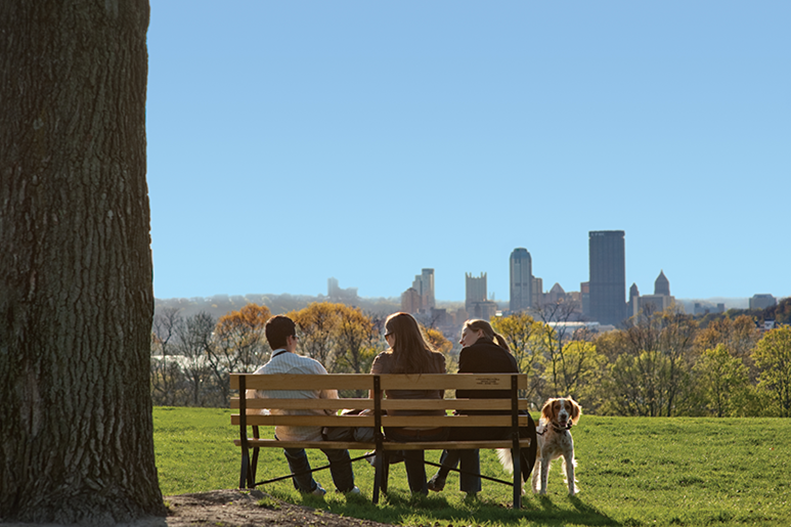New parents often struggle with how to keep their dog included in their baby’s life in safe ways. According to Penny Layne, licensed Family Paws™ presenter and instructor of the Dogs & Storks® program, family members can prepare their “fur baby” for a newborn’s arrival and be proactive in making sure they are a part of the family. In Dogs & Storks®, offered at Magee and other locations throughout Pittsburgh, parents learn such techniques as how to set up the home environment for success and safety, the importance of including dogs from the start in a safe way, and the subtle body language of dogs.
“Often times we forget that the dog needs time to get acclimated to changes going on such as moving the dog’s toy box to make room for a pack and play, moving his resting location for the best place for a babies swing, or even getting used to things that move like swings, strollers, and even high chairs on wheels,” says Penny.
The sooner parents can prepare your pet to transition to life with a newborn the better! Here are a few of Penny’s tips to help furry family members get ready for before and after the baby’s arrival:
Never Miss a Beat!
Subscribe to Our HealthBeat Newsletter!
Thank you for subscribing!
You can now select the specific newsletters you'd like to receive.
You are already subscribed.
Subscribe to more newsletters in our email preference center.
Sorry, an error occurred. Please try again later.
Get Healthy Tips Sent to Your Phone!
Before the Baby’s Arrival
- Identify and decrease attention-seeking behaviors such as pawing, barking, or jumping.
- Become familiar with the subtle signals and body language of the family dog.
- Begin a baby-friendly, flexible routine of feeding and activities – and include the dog!
- Be sure to find opportunities to practice obedience skills.
After the Baby is Born
- Use “success stations” to keep the dog included in the baby’s life using crates, gates and tethers. Success stations allow dogs to safely watch from a distance while being acclimated to the baby and activities that are new to him such as parents feeding or changing the baby.
- Understand that many people go through a temporary phase called “impulsive rehoming phase.” There are times new parents may think their dog would be better off if they rehomed him. However, a large majority of parents end up wanting their pet back and feel sorry they ever chose to rehome them. This is typically just a phase.
- Take up family and friends offers to help by asking them to exercise the dog, or to prepare frozen meal kongs or other mental stimulation puzzles.
[To sign up for the next Dogs & Storks® class visit https://classes.upmc.com/. Search the name of each class in quotes, or select “Magee-Womens Hospital of UPMC” to view all Magee classes. For more information on introducing the family dog to your baby, check out Family Paws™ free parent video http://familypaws.com/2012/introducing-dog-to-baby-welcome-home-webinar/ or visit www.familypaws.com for parent resources and articles. Penny Layne also offers private consultations which can be scheduled at 724-515-7790 or info@myauntpenny.com]
About UPMC Magee-Womens
Built upon our flagship, UPMC Magee-Womens Hospital in Pittsburgh, and its century-plus history of providing high-quality medical care for people at all stages of life, UPMC Magee-Womens is nationally renowned for its outstanding care for women and their families.
Our Magee-Womens network – from women’s imaging centers and specialty care to outpatient and hospital-based services – provides care throughout Pennsylvania, so the help you need is always close to home. More than 25,000 babies are born at our network hospitals each year, with 10,000 of those babies born at UPMC Magee in Pittsburgh, home to one of the largest NICUs in the country. The Department of Health and Human Services recognizes Magee in Pittsburgh as a National Center of Excellence in Women’s Health; U.S. News & World Report ranks Magee nationally in gynecology. The Magee-Womens Research Institute was the first and is the largest research institute in the U.S. devoted exclusively to women’s health and reproductive biology, with locations in Pittsburgh and Erie.
